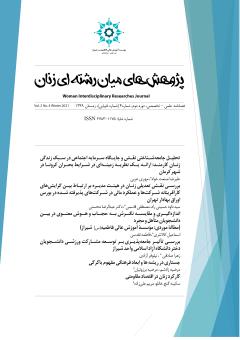تحلیل جامعه¬شناختی نقش و جایگاه سرمایه اجتماعی در سبک زندگی زنان کارمند: ارائه یک نظریه زمینه¬ای در شرایط بحران کرونا در شهر کرمان
محورهای موضوعی : Other related topics
علیرضا صنعت خواه
1
![]() ,
مهری عربی
2
,
مهری عربی
2
1 - استادیار و عضو گروه جامعه¬شناسی، واحد کرمان، دانشگاه آزاد اسلامی، کرمان، ایران
2 - کارشناسی ارشد جامعه¬شناسی گروه جامعه¬شناسی، واحد کرمان، دانشگاه آزاد اسلامی، کرمان، ایران
کلید واژه: سرمایه اجتماعی, سبک زندگی, بحران کرونا, مشارکت در برنامه¬های سلامت,
چکیده مقاله :
امروزه در مواجه با بحران ویروس کرونا، از یک سو مسئله سبک زندگی زنانی که مستقیماً با بیماران کرونایی در ارتباط هستند مورد توجه قرار گرفته است و از سوی دیگر کیفیت روابط اجتماعی زنان کارمند در تعامل با سرمایه اجتماعی (اعتماد، شبکه های ارتباطی و مشارکت) شهروندان با برنامه های بهداشتی ستاد مبارزه با کرونا قرار دارد. هدف اصلی تحقیق بررسی نقش و جایگاه سرمایه اجتماعی در سبک زندگی زنان کارمند دانشگاه علوم پزشکی کرمان در دوران کرونا است. پژوهش حاضر از نظر هدف کاربردی و به لحاظ روش، توصیفی و از نظر نوع مطالعه از نوع تحقیقات کیفی مبتنی بر روش داده بنیاد است. جامعه آماری شامل کلیه کارکنان دانشگاه علوم پزشکی کرمان در سال 1399 می باشد. روش نمونه گیری هدفمند در دسترس می باشد. مشارکت کنندگان در پژوهش را 28 نفر از کارکنان زن در این مرکز می باشند. از مصاحبه نیمه ساختار یافته به عنوان ابزار گردآوری داده ها استفاده شده است. برای رسیدن به معیار قابلیت اعتماد از سه روش: کنترل یا اعتباریابی توسط اعضا، مقایسه های تحلیلی واستفاده از تکنیک ممیزی بهره گرفته شده است. داده ها بر طبق رویه مبتنی بر نظریه زمینه ای در سه مرحله کدگذاری باز، انتخابی و گزینشی (محوری) تجزیه و تحلیل شده اند. براساس یافته های به دست آمده عواملی ازجمله: ساختار زمینه ای مشارکت، کیفیت شبکه های ارتباطی، اعتماد و ترس از امنیت شغلی به عنوان مهم ترین عوامل علی، سبک زندگی در دوران کرونا (تقویت شبکه های مجازی، تماشای فیلم و سریال مجازی، پیدایی آگاهی سیاسی، خرید اینترنتی و ...) به عنوان شرایط زمینه ای، بی تفاوتی اجتماعی و سرمایه اجتماعی درون گروهی به عنوان شرایط مداخله گر، کیفیت بخشی به خدمات بهداشتی، ارتقای سلامت روانی و بهداشت محیطی به عنوان مهم ترین راهبردها و نابسامانی اقتصادی، بهداشت و درمان، حمایت اجتماعی ضعیف و از خود بیگانگی اجتماعی به عنوان پیامدها معرفی می شوند. نتایج بررسی نشان می دهد که می توان از طریق بهره گیری از فضای مجازی، سرمایه اجتماعی سلامت محور را در زنان کارمند تقویت کرد که در آن آموزش های لازم جهت رعایت پروتکل های بهداشتی از طریق شبکه های مجازی ایجاد و اعتماد اجتماعی مجازی به آن دامن زده و مشارکت های فعالانه ای را به دنبال داشته باشد.
In the face of the coronavirus crisis today, not only the issue of the lifestyle of women who are directly related to coronary heart disease has been considered. But also, the quality of social relations of working women in interaction with social capital (trust, network Citizens' communication, and participation with the health programs of the Corona Anti-Corruption Headquarters has taken attention. The main purpose of this study is to investigate the role and position of social capital in the quality of life of women employees of Kerman University of Medical Sciences during the corona. The present research has applied purpose and descriptive research methods. In terms of the type of study, it is qualitative research based on the data method of the foundation. Statistical population includes all staff of Kerman University of Medical Sciences in 1399. Participants in the study are 28 female employees in this University. Semi-structured interviews have been used as data collection tools. Also, three methods have been utilized to achieve the reliability criterion. These methods include control or validation by members, analytical comparisons, and audit techniques usage. Data have been analyzed in three stages of open, selective, and selective (pivotal) coding according to procedure Based on the background theory. Based on the findings, factors such as the underlying structure of participation, the quality of communication networks, trust, and fear of job security as the most important factors influencing the lifestyle during the corona (strengthening virtual networks, watching virtual movies and series, awareness emergence Political, online shopping, etc.) are considered as background conditions. Social indifference and intra-group social capital are also known as intervening conditions. Quality of health services, promotion of mental health, and environmental health are the most important strategies, and economic disorder, health and treatment, and ultimately poor social support and social alienation are introduced as consequences. The results show that health-oriented social capital possibly strengthened in female employees using cyberspace. In which necessary training to comply with health protocols is created through virtual networks, and encourage virtual social trust and pursue active participation.
